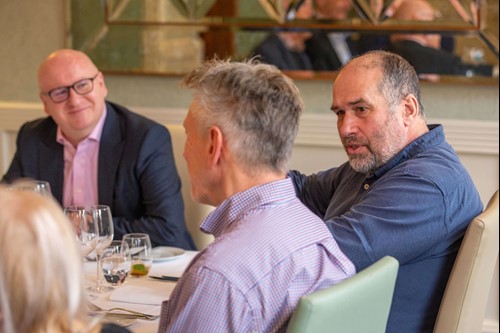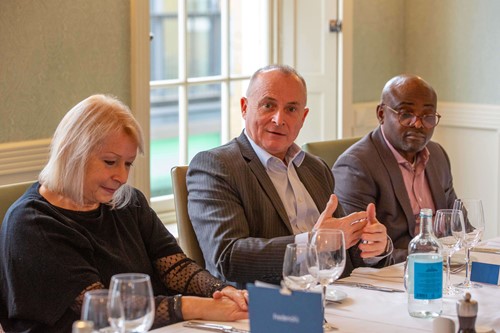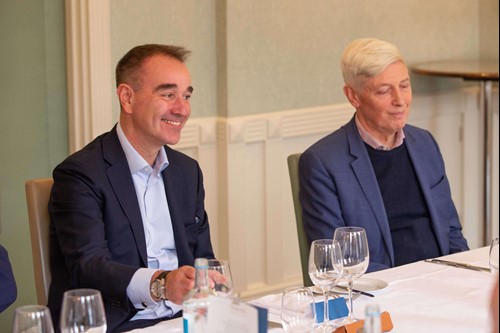Special roundtable focuses on value in FM

This article originally appeared in PFM magazine, available here: https://www.pfmonthenet.net/article/196547/Roundtable-review.aspx
A roundtable hosted jointly between the Salisbury Group and PFM magazine asked the question: ‘how do you get the best value from your FM service provider?’
For anyone looking to engage the services an FM company, one of the questions at the forefront of their mind is ‘how do we get the best value from our FM service provider?’ For FM companies, delivering a great value service for their clients is at the very top of their agenda – but, of course, things aren’t always that straightforward; there are a whole host of issues that can stand in the way of a client getting the service they’re expecting from their FM service provider.
So crucial is this topic to the successful running of the facilities management industry that, at the end of January, nine bright minds from the sector met up to discuss it at a roundtable held by the Salisbury Group at the fabulous Frederick’s restaurant, in Islington, North London. All sides of the fence were represented – FM service providers, clients, and consultants – so that no stone would go unturned in the ensuing debate, which was chaired by PFM editor Amanda Vlietstra.

Clear objectives
As expected, the discussion was brisk and robust – starting with agreement that it was essential that companies looking to engage an FM service provider have a clear set of objectives from the start. This was a theme that was returned to throughout the discussion – but what all the attendees agreed on is that engaging an FM service provider is, as Ms Lloyd-Davies said, “a two-way street for all parties”. “We attract people we want to attract,” Mr Spratt added.
With a variety of different FM providers available, from huge FTSE-listed companies to smaller boutique organisations, the client needs to decide what kind of partnership would best meet its needs. While smaller FM providers may offer closer and more focused relationships, the large companies offer benefits when it comes to, for example, large contracts that are spread across the UK, for which a smaller regional-based supplier may need to outsource some of the work. One thing the panel were very clear on, however, was that “cheapest isn’t always best!”
Trust between the client and the FM service provider is essential; without it, the partnership is doomed to failure from the start. The attendees were clear that if you can’t trust that your FM service provider is working hard to fix issues as they arise, and give them the ability to fix those problems without having to get sign-off through a long chain of senior management, then the relationship will struggle.
Communication, of course, is key to successful partnerships; without it, there’s simply no possibility of success. But what’s equally as important from a client perspective is that the FM service provider truly understands the needs of your business – something that Mr Iyaniwura highlighted. “You need an FM provider who is conversant with the business’ drivers, and who understands how they can contribute to that,” he said. Knowing the client, and treating them as a customer rather than a key account, is also crucial to maintaining a good working relationship, in Mr Spratt’s view.
“One thing the FM industry could do better at is understanding the customer’s customers,” Mr Lunt suggested. All agreed that the end user experience is extremely important to delivering an effective service; and it was also pointed out that, with access to social media, service users can also be very quick to go online and highlight mistakes or slow service from their service provider. While this need to provide ‘on demand’ services can pile the pressure on to FMs – who are themselves often reliant on suppliers – Mr Spratt suggested that, from a positive perspective, it could be viewed as a motivational tool for senior management, a reason to truly embed an understanding of the client’s core objectives into the service offering.

Transactional relationships
However, the role that money plays in the relationship between client and facilities manager cannot be overlooked. It’s a hard fact that that the nature of partnerships in FM are transactional. And, while many of those partnerships may be based around trust, clear communication and alignment of objectives, the panel agreed that there are a significant number of partnerships in which the client’s aim is to reduce costs wherever possible. For FMs, this can be extremely difficult – if you’re asked to make cost savings, where do you find those savings without making compromises that may prove unpalatable to the client or end user?
Mr Spratt suggested that, in such circumstances, the FM has a responsibility to “push back and be realistic.” While this may not always be an easy path to take, the fact is that making cost savings in the middle of a cost-of-living crisis – in a business that historically has tight margins – may result in compromises that aren’t just unpalatable, but have the potential to be unsafe. The panel agreed that safety always has to be the top priority for any FM/client partnership.

Dual pressures
But where does this leave FMs, who may be facing dual pressures from their clients to reduce costs as well as from suppliers who are increasing theirs as a result of the current economic environment? Technology is being presented as a solution to help reduce some of those pressures for FMs while delivering cost-savings for their clients, but the panel felt that the demand for IoT and workplace technology at the moment was to some extent “supplier-driven.” Customers are aware of the importance of data – but not always sure what to do with it once they’ve got it. This, however, is expected to change as the technology becomes increasingly embedded in the workplace.
There’s certainly no doubt that it’s a challenging time for the FM industry right now – as it is for any industry sector. But the round table discussion showed just how forward-thinking the industry is – combining innovation with a clear understanding of the practical demands of the job. Clients looking around for FM providers are, in many ways, spoilt for choice – but by being very clear about their objectives, realistic about costs, equally realistic in their expectations of delivery, and able to keep their lines of communication open, their perfect partnership awaits.
The roundtable attendees
- Andrew Lunt, Group Managing Director at the Salisbury Group
- Nick Platt, Managing Director of Sales and Marketing at the Salisbury Group
- Ulf Muller, Consultant and Business Unit Director at myfm
- Andy Iyaniwura, Head of Facilities at UCA
- Chris Spratt, Director of International Property and Services at Cambridge University Press
- Neil Manning, Head of FM, Royal British Legion
- Bernard Crouch, Director, AcumenFM
- Joanna Lloyd-Davies, Consultant
- Paul Roche, Head of Facilities – Northern Europe, EFM
